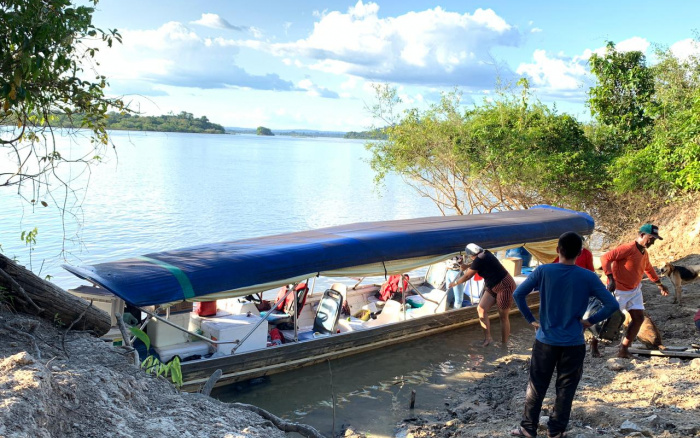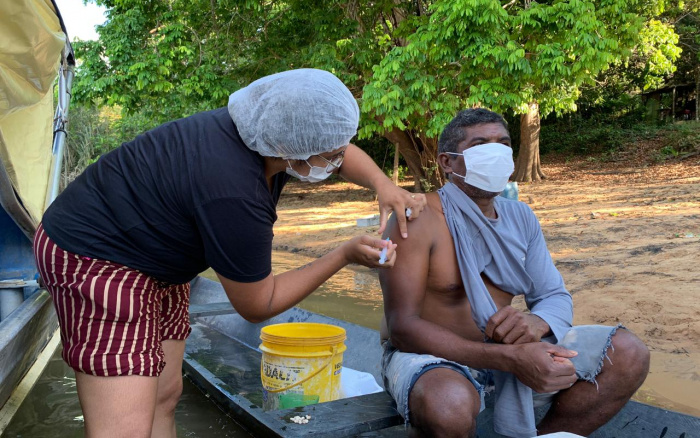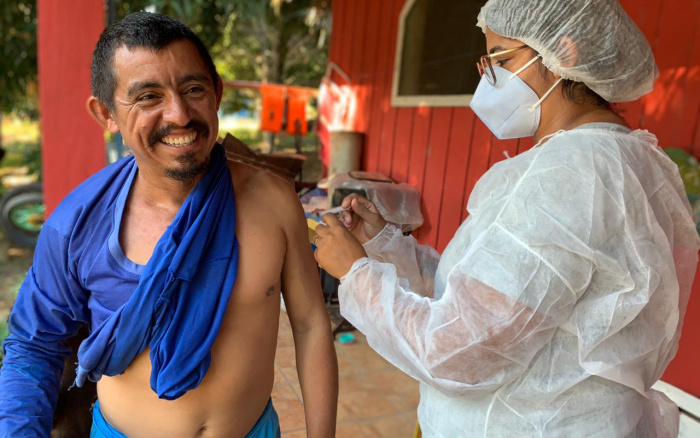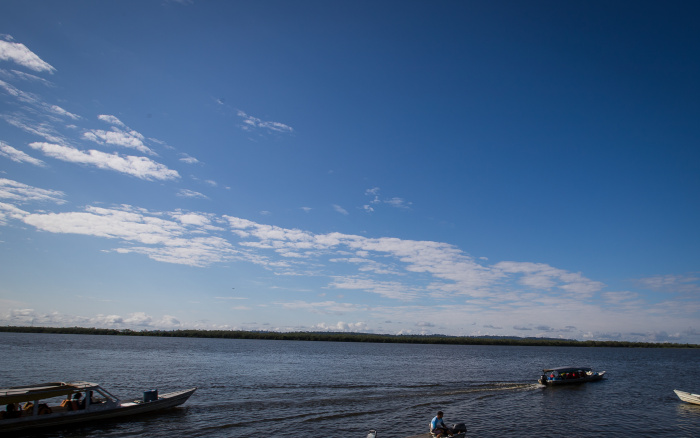Você está na versão anterior do website do ISA
Atenção
Essa é a versão antiga do site do ISA que ficou no ar até março de 2022. As informações institucionais aqui contidas podem estar desatualizadas. Acesse https://www.socioambiental.org para a versão atual.
Covid-19 vaccine reaches riverine people in Terra do Meio, Pará (PA)
Wednesday, 30 de June de 2021 
Esta notícia está associada ao Programa:
Over a thousand riverine dwellers were vaccinated during a health expedition which covered 2,200km of rivers in the state of Pará. Riverine people from the city of Altamira and nearby areas were also vaccinated.
A Covid-19 vaccine has reached the riverine people of Terra do Meio (Pará). Since the end of May, 1,030 riverine dwellers living on the banks of the Xingu, Iriri and Riozinho do Anfrísio rivers have been vaccinated against the new virus. The vaccines arrived by boat as part of a health expedition which left on the 28th May and had covered over 2,200km by the 18th June. In addition to the vaccine, health professionals on the expedition provided assistance and clarification to the population.
The boats went up the Xingu river and vaccinated adults at the Rio Xingu Extractive Reserve and the Serra do Pardo National Park, before turning onto the Iriri river to take the vaccine to the riverine dwellers of the Rio Iriri, Resex Terra do Meio and Riozinho do Anfrísio Extractive Reserves, and the regions of the Maribel, Soledade and Cupi communities. Vaccinations were also applied within the municipality of Altamira itself and its surrounding communities.
All vaccinations applied were first doses of the Astrazeneca/Oxford vaccine. The expedition is a partnership between the Residents’ Associations of the Rio Xingu, Rio Iriri and Riozinho do Anfrísio Extractive Reserves, the Municipality of Altamira, Instituto Chico Mendes de Conservação da Biodiversidade (ICMBio), the Pará State Health Department, Instituto Socioambiental (ISA) and Health in Harmony.
It is a victory for these traditional communities, who were listed as priorities for vaccination by the National Immunisation Plan (PNI). The municipality of Altamira was slow to follow guidance and other groups were jumping ahead. The communities spoke up, claimed their rights and demanded the vaccine.
The Public Ministry of Altamira was alerted and made a recommendation for the populations to be prioritised in accordance with PNI guidance. After many meetings and much coordination with the State and municipality, the riverine people were able to achieve: 682 doses applied during the expedition to conservation units, and a further 348 doses applied to riverine people in the city and over the course of two smaller expeditions carried out locally.
Vaccination is a dose of hope for these communities, who were on high alert when Covid-19 reached them: riverine people live many kilometres away from the city’s health infrastructure, namely hospitals and intensive care beds for serious Covid-19 cases. The most remote community in the municipality of Altamira is around 500km away from the urban centre and during certain times of the year, when the Xingu river is dry, the journey by boat can take up to a week. In severe cases, transport can only be done by air.
“It was very gratifying to take the first dose. We’ll take a second one soon. We will continue to take all the preventive measures we did before. Using masks, hand sanitiser. Everybody is taking precautions. We had waited so long that we had even lost hope”, says Ana Célia, a resident of the Rio Xingu Resex.
The feeling of gratitude and joy was very strong according to Naldo, a technical advisor to the riverine associations. “They were very happy and grateful because they didn’t think the vaccine would make it to them. They said they saw on TV the queues of people trying to get vaccinated, people dying because they didn’t want to be vaccinated”, he says. Some people were a little hesitant due to all the fake news there is on the subject. But the health teams fought back against false information and the vaccine rates were very high.
A new expedition will be organised in the coming months to complete the vaccination. This action was supported by Amazon Watch, Skoll Foundation, RFN and the European Union.
BREATHE XINGU CAMPAIGN
The Breathe Xingu Campaign - which involves 35 social movements and civil society organisations from Altamira (PA) who organised a campaign to face the second wave of Covid-19 in Brazil’s largest municipality - also supported the 2nd riverine vaccination expedition in communities close to the centre of Altamira. Vaccination is coordinated by the municipality’s Health Department and covers the following locations: Boa Esperança, Tapuama, Jatobá, Jaboti, Ilha Grande, Furo do Prego, Assopra Cavalo, Salvaterra, Travessão do Ecalaço, Travessão do Largio, Cajueiro, Travessão da Firma, Catituba, Espanhol, Picadinho, Picadão and Travessão do Espelho. There were two vaccination points, one at Ilha do Chicote, the other at Passaí, as well as a centre for exclusive assistance for indigenous riverine people in Morro dos Araras. The Breathe Xingu Campaign lent support in transport logistics, fuel and meals for vaccination teams and residents being vaccinated.
Guardians of the Forest
The riverine people of Terra do Meio have lived in this region of amazon forest in Pará for over 100 years. They are descendants of indigenous peoples and migrants who came to extract latex during the rubber booms of past centuries.
Part of their territories are delimited as UCs (Conservation Units) - Extractive Reserves and Full Protection Units. Alongside the region's indigenous peoples, the riverine people use forest management to produce rubber, nuts, babassu and over 15 products that are marketed by a Canteen Network.
“The community lives from the forest, they have love for the forest, they are born and raised there, they are sustained by it”, says Naldo. “They have very efficient management of the forest, so much so that we have been in one of the most preserved areas of forest for over a century. They are the real guardians”, he says.
This wealth is increasingly under threat from illegal activity that has no regard for the future of the forest.
Illegal mining, logging and forest clearing to raise cattle are threats to riverine people’s territories and are being encouraged by the federal government. Over 120,200 hectares have been deforested in UCs of the Xingu basin between 2018 and 2020, according to monitoring by Rede Xingu+. During the same period, over 366km of illegally opened roads were detected in the Riozinho do Anfrísio Resex, with almost half of the roads (46%) being opened in 2020 alone.
As loggers advance over the territory building roads, they make dams in streams and cause environmental damage. This destruction is directly related to what we are living today, as explained by Biviany Rojas, coordinator of ISA’s Xingu program: “Health and protection of the territories are the rights of indigenous peoples and traditional populations, and their guarantee goes beyond the territory of the Terra do Meio communities. The Covid-19 pandemic and the climate crisis have made evident what we already knew: there is no possible future without the forest and the populations that manage and protect it”.
Clara Roman
ISA
Imagens:










